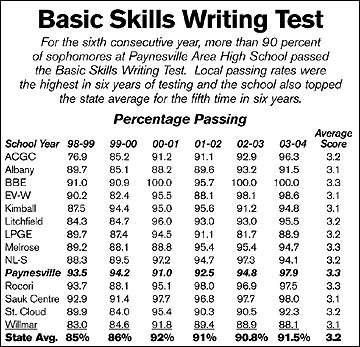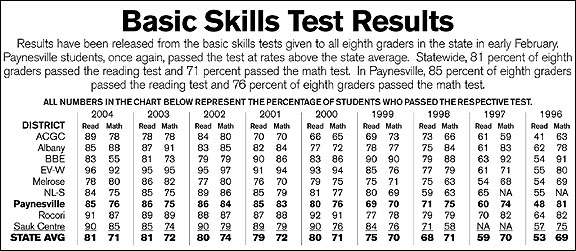Paynesville students test above state averages
Nearly 98 percent of tenth graders at Paynesville Area High School passed the writing test, the highest passing percentage in the six-year history of the writing test. The state average was 91.5 percent passing.
 For the eighth graders at Paynesville Area Middle School, 85 percent passed the reading test and 76 passed the math test. The state averages were 81 percent and 71 percent passing respectively.
For the eighth graders at Paynesville Area Middle School, 85 percent passed the reading test and 76 passed the math test. The state averages were 81 percent and 71 percent passing respectively.
Writing Test
Ninety-five of 97 sophomores at PAHS passed the writing test, given in January, this year, the highest passing percentage the school has achieved.
"The students did well because they take the test seriously," said Amy Flanders, who teaches sophomore English at PAHS. "Of course, this is a high stakes test: it must be passed in order for students to graduate. The students can be proud of themselves for doing so well."
The writing test is graded on a scale of 1-6, with scores of 1-4 for basic skills and scores of 5-6 for essays that go behind the basics.
According to the scoring guidelines, the scoring goes: 1 - a very inadequate response; 2 - a less than adequate response; 3 - an adequate response; 4 - a more than adequate response; 5 - a skillful composition; and 6 - an exceptionally skill composition. Essays are judged on organization, clarity, focus, structure, and using support and elaboration. They also can be penalized for errors in convention like spelling or grammatical mistakes.
The sophomores wrote a practice test, which Flanders evaluated, and then she worked with students individually to identify errors to avoid on the actual test.
The question for this year's exam was: "If you could live anywhere, where would you like to live? Tell about that place and explain why you chose it."
Reading and Math Tests
Though the district's eighth graders passed the reading and math tests at rates above state averages, reading scores continue to outpace math scores on the basic skills tests. Since 1996, when the basic skills tests began, the percentage of eighth graders passing the reading test has increased from 48 percent nine years ago to 85 percent this year, which was only one percentage point off the district's high, recorded in both 2002 and 2003.
In math, on the other hand, such progress is lacking. In 1996, 81 percent of PAMS eighth graders passed the math test; in 2004, 76 percent did. The progress in reading - and the plateauing in math - is evident in the raw scores. In the past five years, the average score for PAMS eighth graders in the reading test has increased each year: 630.7 in 2000; 646.4 in 2001; 649.7 in 2002; 650.3 in 2003; and 653.7 in 2004, a new high. Math scores, on the other hand, are at a five-year low: 635.4 in 2000; to 631.1 in 2001; to 646.6 in 2002; to 632.4 in 2003; to 629.1 in 2004.
While the district's math scores are still good, in this era of competitive schooling, with parents and students having choices to enroll in other districts or home school and with test scores being used to judge schools under No Child Left Behind, school districts need to continue to improve their testing results.
In order to boost its math testing scores, the school district has targeted its elementary curriculum, which is believed to be out of date, and has targeted having elementary students spend more time on math, efforts that should improve test scores but not immediately.
This year, for instance, the purchasing cycle at the elementary school called for new language arts textbooks, but that series will be kept so new math books can be bought. (The district tried this year to move textbooks down a grade to bolster its math teaching - i.e. having second graders use third grade textbooks - but this proved mostly unworkable and most grades went back to their grade-level texts.) The elementary mathematics curriculum was targeted in part due to scores on the Minnesota Comprehensive Assessments (MCA), given to third and fifth graders as a judge of progress (not required for graduation).
Paynesville's MCA results show progress of elementary students in reading but not as much in math.
For instance, this year's eighth graders took the MCAs as third graders in 1998-99. On that test, 62 percent scored at a level that predicted they would pass the basic skills test in eighth grade. But when they took the MCAs as fifth graders, 79 percent tested at a level that indicated they would pass the basic skills reading test, an increase of 20 percent in two years.
In math, on the other hand, 61 percent of this year's eighth graders tested at a passing level as third graders on the MCAs in 1998-99. Then, as fifth graders, 64 percent tested at a passing level, an increase of only three percent in two years.
Individual test results are mailed to students and parents. Anyone not passing the basic skills test will have to retake it and pass it before graduating.

Contact the author at editor@paynesvillepress.com • Return to News Menu
Home | Marketplace | Community